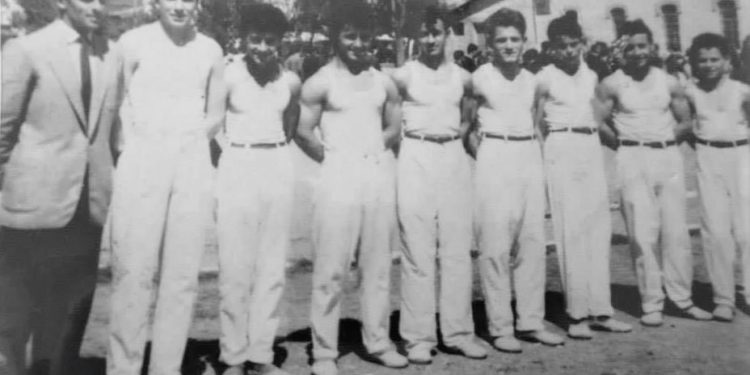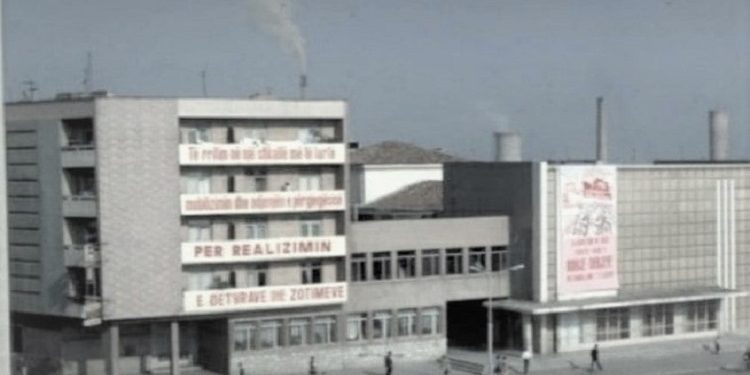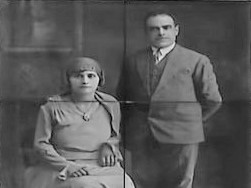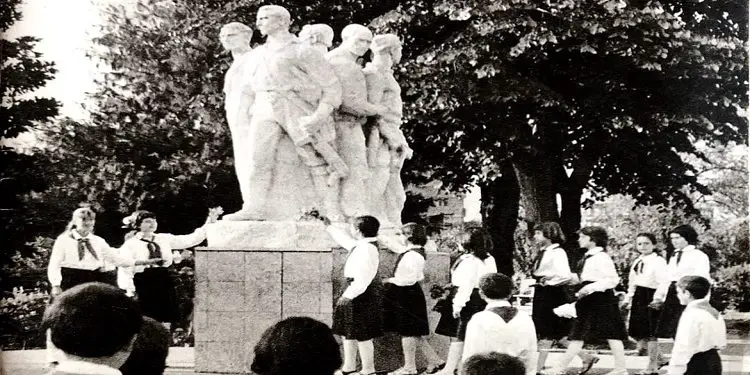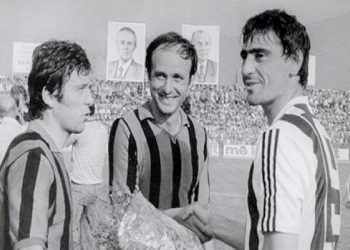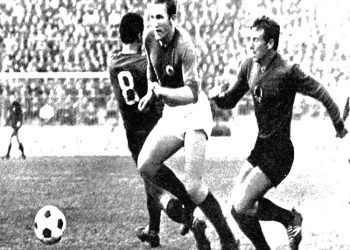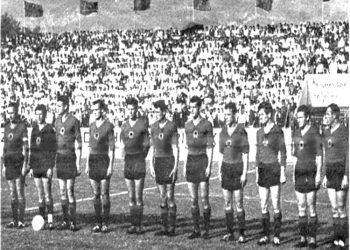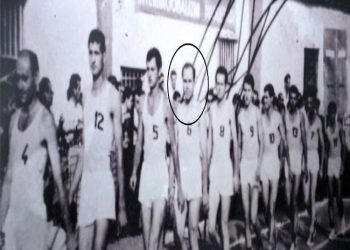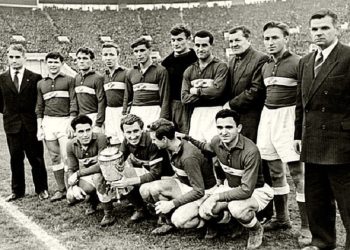By Namik Mehmeti
Memorie.al / A family with an ordeal of suffering, persecution, and imprisonment, a civil family that radiated a European culture, where its construction was combined so naturally and with a feeling of love. The Karafili family, where Niko Karafili from Korça had preferred to combine marriage by throwing hooks from the North of Albania, namely from Shkodra, with Marije Mirashi, became known not only for the civic traditions they inherited, but also for their thirst for education. with a European culture, but also with a strong nationalist feeling, with the desire and sacrifices to see a European Albania.
The Karafili family, which was known in Shkodër after the establishment of the communist dictatorship in 1944, through its heirs, such as: Franko, Nini and Dodona, a generation of heirs born to deal with sports. The name of this noble nationalist family was previously known, respected and honored in the other city, at the other end of Albania, in its southeast, in Korça.
Niko Karafili, who started his journey to justify the name of his ancestors, who for the independence of Albania, for the protection of the Albanian lands from the envious invasions of the Greeks and Serbs, had made a valuable contribution, taking the roads of Europe to be educated, putting his knowledge and culture at the service of the nation.
Niko studied at the most famous European Universities, in Montepellier, France and Liege, Belgium. He has defended diplomas with excellent results, in the fields of commercial, financial and consular science. At that time, he had a superficial acquaintance with the student of Natural Sciences in Montepelljer, the future dictator of Albania, Enver Hoxha.
Niko, I avoid meetings with the student rumored in Albanian circles, for his non-serious attitudes and, moreover, for the sympathy that the future communist dictator showed for the Marxist and communist groups in the West. He returned to his homeland, Albania, in 1934, to put into practice the knowledge he had, in his profession as a financial expert.
For this, with the decree of King Zog I, he started working in Tirana, first as a financial officer and then, showing his skills in the profession as a financier, he was named Head of Valuables, in the Ministry of Finance, until in 1945. He then returns to his hometown, Korça, where he works as a financier in a state enterprise and enjoys the sympathy of the workers and the directorate, but is always under the strict surveillance of the State Security.
The meeting in Tirana with the dictator Enver Hoxha, who, using an approach of Niko Karafili, near the “Flora” store, to exercise his activity, to do private accounting, the future prime minister of Albania, had put him on the list of Western intellectuals who , would suffer his punishment.
There, Niko Karafili, would witness and learn some secrets that brought Albania closer to an ominous future. He was included in the list of intellectuals who had been educated in the West and mastered five foreign languages, where the English language had also penetrated the family.
This and the staging that was concocted in Korçë, allegedly for the loss of some monetary values in this enterprise, the communist dictatorship, realized the arrest of Nikos, together with the director where, after seven months of investigations and torture, the court decided the punishment by firing squad which, was executed on May 17, 1952.
That event of that time shocked the city of European culture, Korça, an event that heralded a storm of tragic reprisals for the intellectuals who lived and worked in that city, known since the time of the Kingdom of Zog, as “Little Paris”.
(Even though a full 32 years have passed since the collapse of the communist regime, even to this day, the heirs of Niko Karafil have not found the support of the competent bodies in Korça and Tirana, for finding the remains of their beloved man).
Niko’s brother, Lluka Karafili, who had as his wife Angjelina Mirashin, sister of Marije (Niko’s wife), seeing that their future was bleak and constantly under the surveillance of the State Security, decided to settle in Shkodër , near the relatives of the women of the Mirashi family.
Marija with her two sons, Zefin and 9-year-old Franko, found support in her tribe, where from her father, Zef Mirashi, a quilt merchant and owner of a hotel in Lezha, they had not inherited any great wealth to afford the living.
For the two sisters, Marije and Angjelina, after the death of Nikos and the ill treatment of his brother Llukes, by the dictatorial state of Enver Hoxha, a difficult life began that required sacrifices to cope economically.
Lluka, who had contributed with a conscience and dedication to the development of education in Albania, working from Korça to Shkodër, from Vlora to Lushnje, from Delvina to Konispol, giving help in the publication of the primer in the Albanian language, being presented as a worthy student of the Serverian Jesuit school and as a member of Father Zef Valentin’s Albanian Institute, where he was also entrusted with the management of the Red Cross Orphanage in Tirana. As soon as the communists entered Tirana, they arrested him, suspecting that he had scientific work connections as an albanologist, with many well-known names, academics and scientists in Albania and Europe, based on this, according to them, he would stage networks espionage to the detriment of his country!
He was held in one of the investigators of the city of Shkodra, but after six months of torture and provocations, he was released, defying the abominable stagings of the uneducated investigators who had come down from the mountains with the partisan opings.
Lluka Karafili, until he passed away at an advanced age, did not become a bridge to the bargains and respirations of the communists, fanatically preserving the ideals of an anti-communist family. Even in the northern city, Shkodër, where the reprisals against intellectual and anti-communist families were equally terrible, the Karafili family could not escape the class war and the dictatorship of the proletariat.
In the epicenter of this attack, were the two sons of Nikos, Zefi and Franko. Zefi had managed to fulfill his father’s wish to get an education and managed to work as an auditor in a state enterprise in Shkodër, but he would not enjoy the fruits of his degree as he was always under the surveillance of the State Security. Although he had shown the skills in the profession earned by merit, he was fired, entering the painter’s trade in the Municipal Services company. From the trampled life of this citizen family, Zef went into depression and died at the age of 45.
While Franko experienced these pains since childhood, he entered with a lot of will to take the high school graduation in Shkodra with his friends. His passion for sports would soon affirm him as a natural talent for volleyball and gymnastics. Elegant body, with physical parameters to be envied, from that improvised volleyball court, in the yard of a well-known family from Shkodra, piano professor Ilda Melgushi, where with his friends, Ndoc Pistulli, Viktor Juban, Filip Guraziu, Gjon Çobën, etc., would take the step to move to the youth team of “Vllaznia”, with the well-known coach in the sport of volleyball, Toni Bianku, and together with young people, such as: Xelal Haxhi, Ndok Pistulli, Viktor Jubani, etc. ., would be declared the champion of Albania. Many sports fans from Shkodër of that time remember Franko, in the position of the shooter, where he was unrestrained in front of the opposing block.
Manifesting a high technical preparation, this is thanks to his talents, to be a versatile sportsman, that is, born for the talent he manifested, not only in volleyball, but also in basketball, football and athletics. And not by chance, Franko would attract the attention of the gymnastics coach at “Vllaznia”, master Mustafa Smaja, a well-known personality of Shkodran sports.
And in the photo as the captain of the gymnastics team, Franko leaves the impression of an elegant athlete who would manifest the exercises in parallel, in rings, on the iron, etc., unfolding a true art.
But his dream and desire were to make a career in the sport of volleyball. And for this dream, he had the support and encouragement of the coaches and specialists of this sport, at the “Vllaznia” Club, such as: Dan Doçi, Franc Jakovës and Mark Grimci.
An incentive and inspiration to pursue a sports career was the fact that in the Karafili family, the two sisters, Nini and Dodona, were established in athletics and volleyball, who made a valuable contribution to “Vllaznia” for several years in a row.
Nini, since the age of 13, competed in the national athletics championship, taking third place in the 100 m races. and 200 m. as well as in the 4×100 m relay.
She quickly gained the trust of the well-known coach, Fehti Dizdari, who, in addition to speed races, also activated her in the 800 m race. Nini justified this belief of the coach in the best way, not only being declared champion, but also improving the national record, held by the well-known athlete, Myzafere Sajli.
In the Shkodra athletics team, in the first years after the war, there was a group of talented girls, who would later make a big name and some of them would be declared ‘Deserved Masters of Sports’, such as : Marije Rranzi, Gjystina Paloka, Pina Vuka, Lajde Banushi, Asime Pipa, Pina Thani, Kjara Paci, Aneta Baba, etc.
These girls would then pave the way for another generation of talented girls who, for 17 consecutive years, “Vllaznia” with Feti Dizdar at the head, would be national champions. Similarly, the other sister, Dodona, in addition to athletics, would represent “Vllaznina” in volleyball, where in 1947, that team would be declared the champion of Albania.
But for Franko, the athlete with a promising future in volleyball, basketball, gymnastics, etc., he did not say to continue that dignified presentation that he made to the youth teams, being declared national champion, with his friends, such as: Juban, Haxhi, Pistulli, Çapaliku, Gjergji, Peja, etc., in volleyball, and his friends in gymnastics, such as: Paçrami, Çuni, Pali, Sopi, etc.
But the “bites in the biography”, where his father’s name (Niko Karafili, shot by the communist regime) was mentioned from time to time, raised their heads every time it was discussed about his future, among the adult teams, as the coaches nor, who discussed Franko’s transition to the adult volleyball, gymnastics and athletics teams, regardless of his 18-year-old age.
If he dreamed of graduating from the “28 Nõntori” gymnasium in Shkodra, where, just as he excelled in sports, he was equally excellent in studies. It had a lot of influence on the presentation of Franko, as a representative of citizen families with European culture, the heritage, either from his mother from Shkodra or his father from Korça. Therefore, from teachers, friends at school and coaches in sports, Franko enjoyed respect and sympathy, with that presentation of a physique, as if it had been carved by a sculptor.
Even the support provided by the leaders of the “Vllaznia” Sports Club was not enough, since the Internal Affairs Branch, the Party Committee and the Neighborhood Council had given the punishment, in the name of the class war. Leaving the sport greatly affected the future of the 18-year-old boy, who, in order to help his mother, tired of life’s suffering, was forced to go to work.
They didn’t do him any favors, to set him up in a profession, but, like all families with a “bad biography”, they also showed Franko the Brick Factory, that is, one of the hardest side jobs. But even in those conditions, he found strength and entered a professional evening school, (in the field of Construction) where he excelled as always in his studies and took up the mason’s trade, working on various works and objects that were being built in Kukës at that time. Elbasan and in his city.
In all these facilities and enterprises where he was sent, he worked with exceptional correctness, not submitting for a single moment to the provocations that were made to him from time to time by the people introduced by the State Security. When he was in the facilities and enterprises of the district of Shkodra, after a tiring day of work, he would find the time for a walk, in the traditional round in Piace, with that elegant and arrogant walk of his.
Franko creates a family, connecting his life with a brilliant girl, the daughter of a persecuted tribe, Gjystina, the daughter of Mirosh Mirashaj, who was declared a kulak and expelled from the properties inherited from generation to generation, which stretched from Ishmi , up to Milot of Kurbin, which at that time were under the jurisdiction of the district of Kruja.
With the fall of the communist dictatorship of Enver Hoxha and his successor, Ramiz Alia, in the early 90s, Franko was one of the first to approach the Democratic Party, where he handed over his membership card to Arben Broci (“The Torch of Democracy”), while he continued to work at the Brick Factory.
Then, for 13 years in a row, Franko served with rare zeal and dedication as an inspector in the Municipality of Shkodra, (head of the branch of the fifth section) where he also performed the duties of the mayor, for the neighborhoods “Serreq”, ” Arra e Madhe” and “Three Heroes”.
What he failed to achieve in his youth, i.e. pursuing university studies, he experienced with the sacrifice to educate his three daughters, who chose their favorite faculties in Milan, Italy.
Thus, Meri graduated with high results in Economics – Trade, Renata in Literature, while the younger Stela (known as “Miss Shkodra”) graduated in Political Science./Memorie.al




